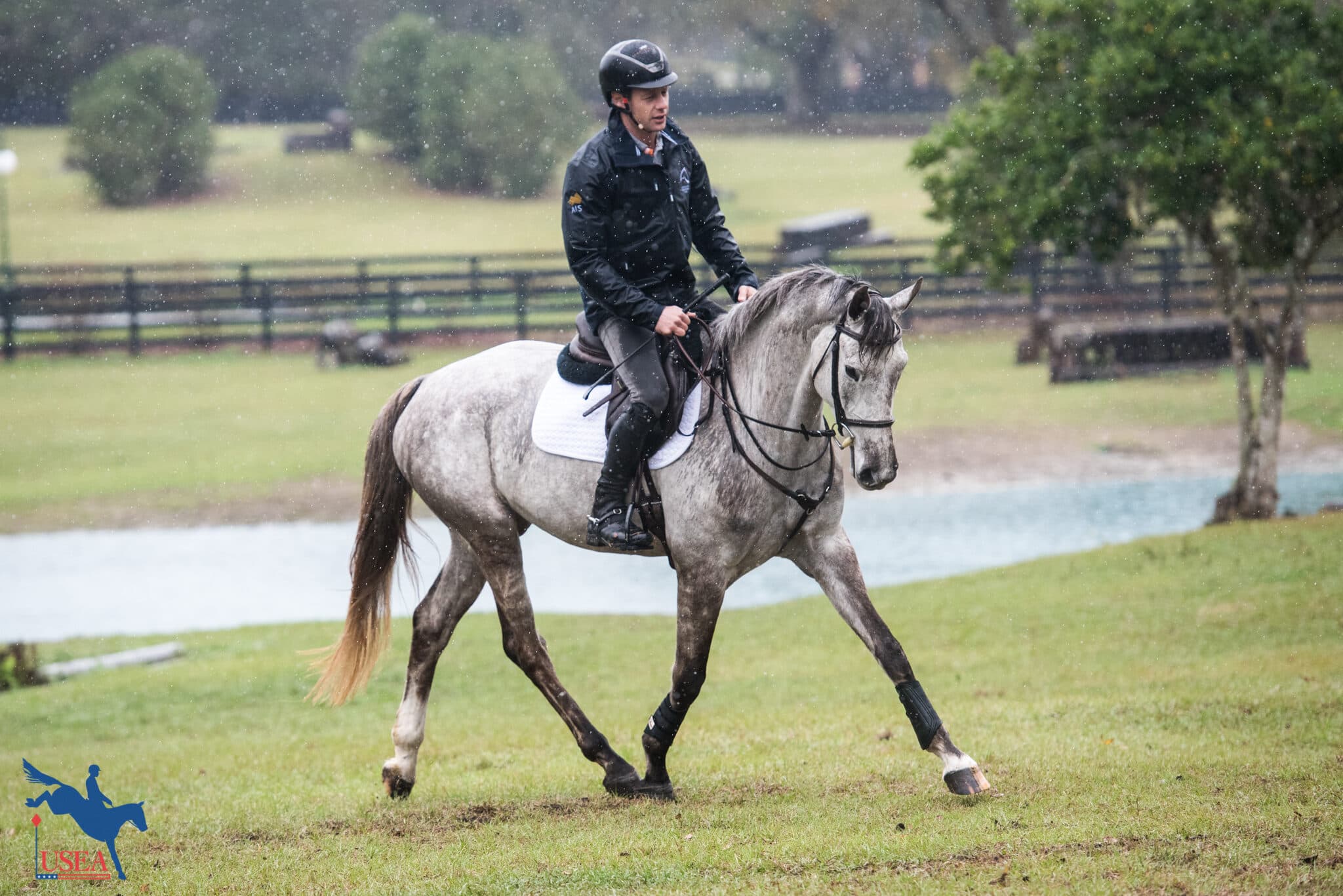Creating A Safe Zone When Exposing Your Young Horse to New Things with Megan Kepferle

The Young and Future Event Horse article series is being provided through a partnership between Mythic Landing Enterprises, LLC. and the USEA.
Whenever you introduce something new to a young horse it can always be a bit stressful. Riding out in a field for the first time is always an important milestone for any young horse, but especially for a young event horse. Not only will riding out help their cross-country education, but it will help them with their balance and confidence, which is important for all three phases.
Before you to try to conquer this new idea, it is important to know your young horse well, and know their comfort zone. Will they prefer to be with a buddy? Will they be better during a quieter time of the day? Or will they be more comfortable in a smaller space such as a turnout paddock? Knowing these things about your horse will help you be successful, not only in this particular task, but in your long term career with your young horse. Kepferle also makes sure to mention that with young horses, it’s important to have plan that lacks a bit of structure, as you never know when your young horse might have an off day and need to take a few steps back to re-establish some previous training. But while you must always remain flexible, you should also always have a goal to serve as motivation throughout the training sessions.
Going out into 10 acres of openness has the potential to be very overwhelming to your young horse, so it’s your responsibility as a rider to make their world smaller and stress-free. If you’re riding out in a field with lots of cross-country obstacles, try to find a space in the field that has nothing around it that can become your “safe zone.” As your horse starts to settle, and this may not happen your first ride out in the field, start to ride a bit closer to those jumps and guage your horse’s reaction, and then come back to your safe zone. This is a really important idea because while you’re challenging your horse mentally, going back to the safe area keeps it from being a high-pressure situation for your horse. This begins to create confidence within themselves and with you as their rider, which is ultimately your goal.
“Be careful to not get too excited while out in the field and feel the need to blaze around your first time out. If you do, that’s all your horse is going to associate with being out of the ring and while we want our event horses to be enthusiastic about being outside of the arena, they also need to be obedient and safe. Being out of the ring should mean lots of different things to your horse as you continue their education. Plan flatwork days that you do out in the field, go cross-country schooling with friends, do your trot sets out-and-about, and add in hack days so that being out of the ring means a variety of things,” Kepferle explains.
Another idea to keep in mind is that if you have an overly sensitive horse that reacts a bit exuberantly to new situations, try introducing new ideas on the lunge line. Depending on your horse, you can work with them either in a rope halter and line or fully tacked up. Thoroughbreds especially tend to be more careful when going from working in the ring with excellent footing to slippery grass of varying terrain. So for these types of horses, it is not a bad idea to plan a few days of outside lunge line work before tackling the task on their back.
It can be a bit overwhelming for any young horse, so it’s important to remain patient and sympathetic when introducing them to any new area. By taking them out on the lunge first, your horse is able to work out their insecurities without a rider on their back. Kepferle continues, “Keep them on the lunge until you can make it totally boring for them. Create a world of neutral and make being out in the field as simple and as underwhelming as it is in the arena.”
The biggest piece of advice that Kepferle can offer to aspiring riders bringing up their own young horse is to have absolutely no timeline. If you can take the pressure off of performing on a certain timeline out of the picture, you will be much more successful overall in the progression in your young horse. And oftentimes you will be pleasantly surprised at how quickly you can check off milestones.
“Bring up a young horse because you want to enjoy the process. Some horses take six months to become confident with a certain skill, while others take two weeks for that same skill. But when you’re patient, no matter how long it takes, it’s so rewarding as a rider and as an owner. Celebrate the little victories, and don’t be shy to ask for advice. Always keep asking questions,” Kepferle concludes.
About Megan Kepferle
Megan Kepferle made her mark on the eventing world when she began working for four-star rider, Sinead Halpin in Central New Jersey. In 2012 Meghan was named the Chef d’equipe for the Area II Young Rider Eventing team, championing three consecutive medal winning teams. After working for Sinead until 2015 she went on to build Kepferle Equestrian, which has become a successful training facility, dedicated to furthering the education of young horses, and up and coming riders of all levels. To learn more about Megan and her program, please visit her website.















